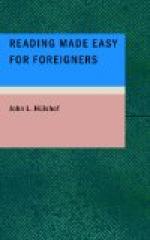The sons departed accordingly, and traveled three months, each in a different direction. At the end of that time they returned; and all came together to their father to give an account of their journey.
The eldest son spoke first. He said: “On my journey a stranger entrusted to me a great number of valuable jewels, without taking any account of them. Indeed, I was well aware that he did not know how many the parcel contained. One or two of them would never have been missed, and I might easily have enriched myself without fear of detection. But I did no such thing; I gave back the parcel exactly as I had received it. Was not this a noble deed?”
“My son,” said the father, “simple honesty cannot be called noble. You did what was right, and nothing more. If you had acted otherwise, you would have been dishonest, and your deed would have shamed you. You have done well, but not nobly.”
The second son now spoke. He said: “As I was traveling on my journey one day, I saw a poor child playing by the edge of a lake; and, just as I rode by, it fell into the water, and was in danger of being drowned. I immediately dismounted from my horse, and, wading into the water, brought it safe to land. All the people of the village where this occurred can bear witness of the deed. Was it not a noble action?”
“My son,” replied the old man, “you did only what was your duty, and you could hardly have left the innocent child to die without making an effort to save it. You, too, have acted well, but not nobly.”
Then the third son came forward to tell his tale. He said: “I had an enemy, who for years has done me much harm and sought to take my life. One evening, during my late journey, I was passing along a dangerous road which ran beside the summit of a steep cliff. As I rode cautiously along, my horse started at sight of something lying in the road. I dismounted to see what it was, and found my enemy lying fast asleep on the very edge of the cliff. The least movement in his sleep, and he must have rolled over, and would have been dashed to pieces on the rocks below. His life was in my hands. I drew him away from the edge, and then woke him, and told him to go on his way in peace.”
Then the old man cried out, in a transport of joy: “Dear son, the diamond is thine; for it is a noble and godlike thing to help the enemy, and to reward evil with good.”
THE DECLARATION OF INDEPENDENCE—1776.
IN CONGRESS, JULY 4, 1776.
The unanimous Declaration of the thirteen United States of America.
When in the Course of human events, it becomes necessary for one people to dissolve the political bands which have connected them with another, and to assume among the Powers of the earth, the separate and equal station to which the Laws of Nature and of Nature’s God entitle them, a decent respect to the opinions of mankind requires that they should declare the causes which impel them to the separation.




